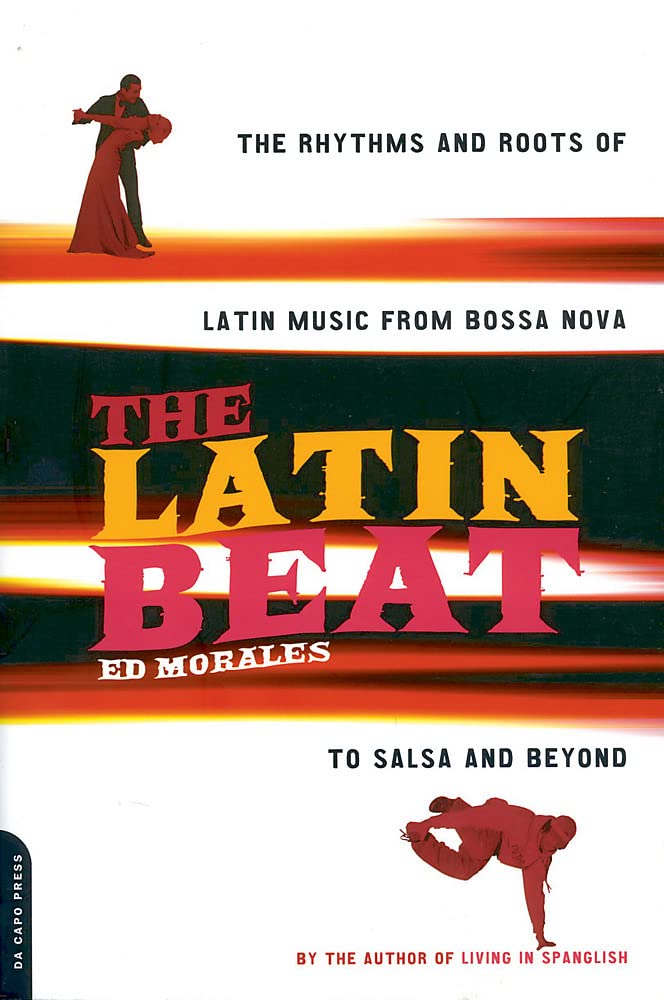

The Latin Beat: The Rhythms and Roots of Latin Music, from Bossa Nova to Salsa and Beyond
A**N
Excellent quick and detailed overveiw for a north american like me
Also I have some friends who are espanol and some friends from Brazil. Not only are the languages very different but so is the music; anyway my two types of friends refuse to associate if i invite them to my house together so I think Mr Morales may be forgiven for not understanding Brazil. Brazil is a very special country unto itself.Also I didn't read it for political history or festival information but I learned alot about Caifanes, Mana, Soda Stereo, Cafe Tacuba, Los Tres, even Juanes and La Ley! which was most delightful and unexpected! Did you know Juanes is the son of a rancher?
D**S
An excellent book - especially for a rock historian
An excellent book - especially for a rock historian, as well as for anyone who is trying to trace the influence of Latin music in the formation of Rock and Roll and Rock.
M**I
Five Stars
love it :)
A**A
A decent survey of Latin music
This book attempts to summarize the music of an entire hemisphere over 400 years in less than 400 pages. Naturally, a lot gets brushed over or even not mentioned. The structure is also a bit odd, with some of the more modern artists covered in the middle chapters, before their precursors and influences have been discussed. The book also leans heavily on its coverage of Afro-Cuban music, which deserves to be covered at length, since it is at the root of most Latin music, but comes off as a bit biased considering how other countries get little to no mention. Also strange is the coverage of Latin Jazz which only focuses on Latin musicians that made jazz and ignores non-Latin artists like Kenny Dorham and Charles Mingus that made great contributions to, and helped gain crossover appeal for Latin Jazz. Dizzy Gillespie gets a little more love, but not enough considering everything he did for the genre. But all that aside, if you want a general survey of Latin music, this is a good place to start. It has enough information to whet the palate and provide a launch pad into deeper research. Experts will hate it. Newcomers will find plenty to learn.
B**T
... And the Beat Goes On!
I really enjoyed this book, The Latin Beat, by Ed Morales. It's kind of like an Idiots Guide to Latin music. The musics covered are as diverse as the cultures of Latin American and what makes it such a compelling read (other then the history of the evolutions of the musics) are the super interesting vignettes of the music makers. The book was published in 2003 and could use a revised edition, as 20 years worth of music has passed. But all told, this book is a very enlightening read and has opened new worlds to me.
J**O
A useful broad survey of Latin musicians through the start of this millenium.
"The Latin Beat" is a useful broad survey of Latin musicians through the start of this millenium. It largely avoids politics. It has a bibliography, as well as additional references hinden in the text. The author acknowledges help from Conrad Herwig, whose recordings include "The Latin Side of John Coltrane" and, along with Brian Lynch, "Que Viva Coltrane". An updated, expanded, and slightly corrected edition, with better citations, would be welcomed.
H**Z
Gross historical/musical inaccuaracies
First, I am basing my poor review mainly on the sections on Brazilian music, which are a significant part of this book.Contrary to the Editorial review stating Mr. Morales' "incredible depth of historical and musical knowledge" I found the author's lack of knowledge of some of the more basic elements of Brazilian history and music culture downright ingnorant.As an example of some of the minute details that may seem insignificant, the famous pre-lenten Carnaval celebrations are not "winter" celebrations since the entire southern hemishphere has opposite seasons from North America. In other more significant areas, the migration of laborers from the north was not due to the "failure of northern coffee plantations" as the coffee regions were all part of southern Brazil. A basic reading of any decent history of Brazil, such as Skidmore's "Five Centuries of Change" would have taken care of such innaccuracies.Erroneous uses of traditional instrument names and the reference of samba as "a call to wild, mass movement, an (...) of percussion, not the structured rhythmic base for improvisation that came from the fusions of African rhythms and courtly European dances in Cuba...samba is more like 'chaos in tempo'" reek of the typical non-Latin view from insensitive writers who knew little about Latin American culture. It is surprising that a latino, especially in 2003, would be subscribing to the exoticism that permeated the work of scholars (and non-cholars) from the early 20th century.The author uses no citations, although he does include a rather short bibliography of sources. Perhaps the auhtor should have focused on the music and history of the parts of Latin America that he is more familiar with, rather than attempt to be all-emcompassing at the risk of demonstrating such utter lack of basic historical and musical knowledge of Brazil.
T**E
Worse book on Latin music EVER!!!!!!!!!!!!!!!!!
This book is so badly written and full of errors and misconceptions that it should be banned, this should be used on how NOT to write a book. One star is way too high a rating...............
Trustpilot
2 months ago
1 month ago